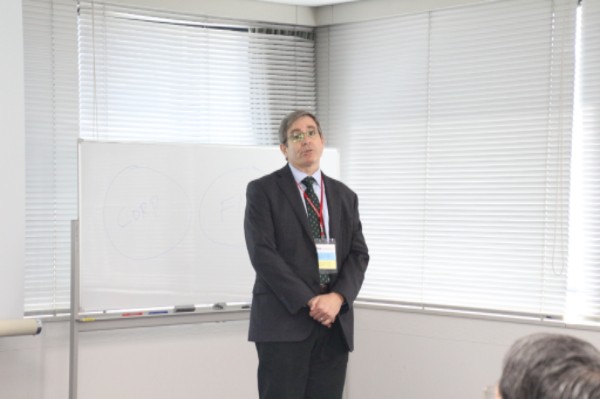2018 ICBASS
The 6th International Conference on Business and Social Science
March 27-29, 2018 Kyoto, Japan
Dr. Raymond, Siu Yeung Chan
PhD, FCCA(UK), FCPA Australia, CPA(HK), CCP(US), HKRFP(HK)
Head and Associate Professor, Department of Accountancy and Law, and Director, MBA and MSc in Business Management Programmes School of
Business, Hong Kong Baptist University
Introduction of Raymond, Siu Yeung Chan
The way forward to professionalism
Abstract
Educated in Hong Kong and the US, Raymond has received several degrees, including BBA(Hons.), MBA, MSc in Information Systems, MSc in Applied Mathematics, Master of Laws, and PhD in Accounting. He has also completed an Executive Education Programme in the Corporate Governance Series offered by the Harvard Business School as well. He is a Fellow of both the Association of Chartered Certified Accountants in the UK and the Certified Public Accountant in Australia, a Certified Public Accountant and a Registered Financial Planner in Hong Kong, and a Certified Computing Professional in the US. He has had near a hundred items of publications, including academic and professional journal articles, conference proceedings, textbooks, and book chapters in the fields of accounting, finance, corporate governance, information science, social science, and business laws. Raymond is currently the Editor-in-Chief of the GSTF Journal on Business Review and an Editorial Board Member of Corporate Governance and Sustainability Review.
Armed with the professional consultancy training from one of the largest professional accounting firms in the world, he was the lead consultant of consultancy projects for many organizations, namely the Rating Departmentof the Hong Kong Government, the Hong Kong Securities and Futures Commission, the Independent Financial Advisors Association, the Society of Registered Financial Planners, Dun and Bradstreet, the Hong Kong Chamber of Listed Companies, etc. In addition to providing consultancy services to various types of organizations, he served as a Small and Medium-sized Enterprises consultant for the Hong Kong Trade Development Council, a semi-government institution promoting trades between Hong Kong and overseas. He was also appointed as a member of the Companies Ordinance Reforms advisory groups, assisting the Hong Kong Government in redrafting the Companies Ordinance of Hong Kong. He is currently a Specialist of the Hong Kong Council for Accreditation of Academic & Vocation Qualifications, a semi-government institution providing accreditation services to non-government funded tertiary programmes offered in Hong Kong.
Raymond was a Founding Vice-president and the Chairman of the Professional Education and Training Committee of the Hong Kong Independent Non-Executive Directors Association, an non-profit institution promoting the status of independent non-executive directors of listed companies in Hong Kong, and is currently an Executive Council member of the Association. With his expertise in corporate governance and the operating process of board of directors, he was appointed as an Independent Non-executive Director and the Chairman of the Audit Committee at a listed company in Hong Kong several years ago, overseeing the accounting, auditing and finance functions of the company.
Title
“Ladies’ Night—Sex Discrimination or Economic Motives: Comparisons of Hong Kong, the United Kingdom and the United States”
Abstract
t is quite a norm for bars and nightclubs in major cities around the world to hold ladies’ nights on slow weekday nights, giving female patrons price concessions for entrance fee and drinks. These promotions are held on the basis of the general observation that women are less likely frequent visitors to bars and nightclubs than men. Relying on basic economic notions of supply and demand, bars and nightclubs will enjoy bigger revenue from a larger number of customers by encouraging women to come to the venues through offering generous discounts on services to them. The government will also receive a larger amount of tax revenues charged on the profits and sales of the bar and club industries.
Whether these promotional gimmicks run afoul of the sex disrimination laws of those countries where ladies’ nights are popular is contraversial. In general, most countries have such laws in place protecting men and women from discrimination on the ground of sex or marital status. Historically, women have held a second-class position relative to men, with prevailing view being that women’s only proper roles were wives and mothers, and women were financially dependent of men. Thus, women have usually been the targets of discrimination. In contrast, it is men who are said to be discriminated in ladies’ nights. Opponents of ladies’ nights accuse bars and nightcluds to have employed sex-based differential pricing as a marketing strategy based on the archaic gender stereotypes to lure women into establishments in order to use their physical appearance to influence men’s spending decisions. Thus, sex-based disparate pricing hurts both men and women by demeaning them based on archaic notions of sexuality and traditional gender roles. Yet, supporters of ladies’ nights consider gender stereotypes no longer valid nowadays as the world has been changing so fast recently in such a way that also bring along with considerable changes in the roles of females in the sphere of family life. Women have become more financially independent now. Also, complaints of the practices of ladies’ nights are very rare around the globe, suggesting that people of both sexes do not consider ladies’ nights as discriminating or they consider this practice too trivial to warrant their time and energy to file a complaint in view of the fact that the differences in the prices charged to women and men are minimal. It seems that no one is a loser from adopting this practice. In this case, why should we still need to prohibit this type of promotional gimmicks similar to other more serious and genuine types of sex discrimination acts (such as sex discrimination in employment)? Would it be possible to allow these promotions under certain conditions? If it is so, what should these conditions be?
To better understand this topic in more details, this speech reviews the sex discrimination laws related specifically to the ladies’ night regimes of the United Kingdom, the United States and Hong Kong. It also examines how commentators and the public see the promotions offered by ladies’ nights and whether they consider these promotions discriminative. This speech also uses recent gender statistics in Hong Kong to analyze whether the archaic gender stereotypes are still valid now or not. Finally, this speech suggests how relevant laws and regulations could be revised to accommodate ladies’ nights held at local entertainment venues under certain conditions.
Introduction of David C. Donald
David C. Donald is a Professor in the Law Faculty of The Chinese University of Hong Kong and Executive Director of CUHK’s Centre for Financial Regulation and Economic Development. David previously taught at the Institute for Law and Finance of the University of Frankfurt, Germany and worked as a commercial lawyer in the US and Europe. His publications include A Financial Centre for Two Empires: Hong Kong’s Corporate, Securities and Tax Laws in its Transition from Britain to China (Cambridge, 2014), The Hong Kong Stock and Futures Exchanges – Law and Microstructure (Sweet & Maxwell 2012), and (with Andreas Cahn), Comparative Company Law: Texts and Cases on the Laws Governing Corporations in Germany, the UK and the USA (Cambridge, 2nd ed. 2018). David is currently a member of Hong Kong’s Standing Committee for Company Law Reform and the Hong Kong Institute of Chartered Secretaries Academic Advisory Panel. He is also a member of the Higher Education Forum Core Committee and the Council of the World Interdisciplinary Network for Institutional Research (WINIR)
Title
Why Designing Corporate Governance to Serve the Logic of Financial Markets Damages Business Corporations
Abstract
Market traders must operate with sufficient spread – buy low, sell high (or vice versa). Fundamental value is irrelevant, provided the trend of market price is favorable. Liquidity is key, for traders must be able to react to market trends. Securities reflecting relatively unknown products – such as a mass-market electric automobile – present a good opportunity for healthy volatility in which skillful traders can benefit as prices soar and plunge. The logic of the financial market is one requiring liquidity, volatility, and rapid reaction (or better, anticipation) in connection with price shifts.
Entrepreneurs engaged in innovative businesses require patience and understanding, as they explain how their new product or service fits into or replaces an existing network of items already in use. They seek to demonstrate the fundamental value of their offering, and hope to achieve a stable respect in the market for products or services. The logic of productive business is one requiring rational assessment, some patience, and ultimately a stable picture of value.
The logic of the financial market is almost diametrically opposed to that of productive business, yet leading legal systems tie the governance of business corporations to financial market needs. At least since the 1980s, international corporate governance discourse, following an American lead, has centered around a need to focus corporate activity on the interests of financial investors.
The results have clearly marked recent economic history: a generation of corporate managers playing the market for the shares of their own companies, an accelerated frequency of market crises, innovative companies being dismantled, ‘liquified’, by investors to generate spurts of cash for instant consumption, and an increasing number of companies seeking to protect themselves from market influence.
In the context of US corporate law, this paper investigates how a better understanding of financial market logic is leading to a reevaluation of corporate governance away from a model that impedes and distorts the operation of business corporations.












